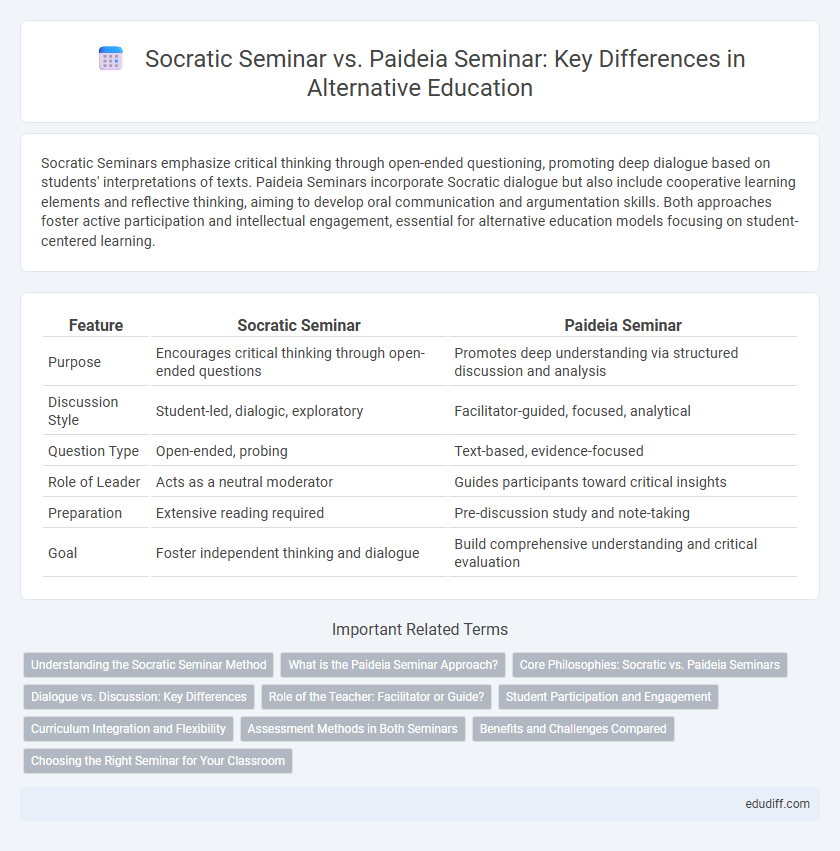Socratic Seminars emphasize critical thinking through open-ended questioning, promoting deep dialogue based on students' interpretations of texts. Paideia Seminars incorporate Socratic dialogue but also include cooperative learning elements and reflective thinking, aiming to develop oral communication and argumentation skills. Both approaches foster active participation and intellectual engagement, essential for alternative education models focusing on student-centered learning.
Table of Comparison
| Feature | Socratic Seminar | Paideia Seminar |
|---|---|---|
| Purpose | Encourages critical thinking through open-ended questions | Promotes deep understanding via structured discussion and analysis |
| Discussion Style | Student-led, dialogic, exploratory | Facilitator-guided, focused, analytical |
| Question Type | Open-ended, probing | Text-based, evidence-focused |
| Role of Leader | Acts as a neutral moderator | Guides participants toward critical insights |
| Preparation | Extensive reading required | Pre-discussion study and note-taking |
| Goal | Foster independent thinking and dialogue | Build comprehensive understanding and critical evaluation |
Understanding the Socratic Seminar Method
The Socratic Seminar method emphasizes critical thinking through open-ended questioning and dialogue, encouraging participants to explore ideas deeply and collaboratively. Rooted in Socrates' teaching style, it fosters an environment where students analyze texts and articulate their interpretations without relying heavily on external authority. This approach contrasts with the Paideia Seminar by focusing more on inquiry and less on teacher-led discussion, promoting active student engagement and reflective thinking.
What is the Paideia Seminar Approach?
The Paideia Seminar approach emphasizes critical thinking and collaborative dialogue centered around open-ended questions derived from complex texts. It integrates Socratic questioning techniques with structured student-led discussions to foster deeper comprehension and reflective thinking. This method promotes active listening, evidence-based reasoning, and respectful discourse as key components of the learning process.
Core Philosophies: Socratic vs. Paideia Seminars
Socratic Seminars emphasize dialectical questioning rooted in Socratic philosophy, fostering critical thinking through dialogue and inquiry. Paideia Seminars integrate a holistic educational approach inspired by the Greek concept of paideia, combining intellectual, moral, and social development via collaborative discussion. Both prioritize student engagement but differ in their foundational principles--Socratic Seminars focus on probing questions to uncover truth, while Paideia Seminars cultivate well-rounded, ethical individuals through interdisciplinary discourse.
Dialogue vs. Discussion: Key Differences
Socratic Seminars center on deep, reflective dialogue, encouraging participants to explore open-ended questions and develop critical thinking through shared inquiry. Paideia Seminars balance dialogue with structured discussion, integrating teacher-led guidance to connect texts with broader educational goals. The key difference lies in Socratic Seminar's emphasis on collaborative meaning-making versus Paideia Seminar's blend of dialogue and direct instruction.
Role of the Teacher: Facilitator or Guide?
In Socratic Seminars, the teacher acts primarily as a facilitator who encourages open-ended questioning and critical thinking without imposing opinions. Paideia Seminars position the teacher more as a guide, providing structured support to help students delve deeper into texts and connect ideas collaboratively. Both approaches emphasize student-centered dialogue but differ in the level of teacher intervention to foster intellectual engagement.
Student Participation and Engagement
Socratic Seminars emphasize open-ended questioning and critical thinking, fostering deep student participation through guided dialogue that encourages diverse viewpoints. Paideia Seminars integrate collaborative learning with structured discussion, promoting higher engagement by combining textual analysis with student-led inquiry. Both methods enhance student interaction, but Socratic Seminars prioritize philosophical inquiry while Paideia Seminars balance critical thinking with cooperative learning dynamics.
Curriculum Integration and Flexibility
Socratic Seminars emphasize a structured curriculum integration by aligning discussions closely with classical texts and specific standards, promoting deep textual analysis. Paideia Seminars offer greater flexibility, incorporating interdisciplinary themes and contemporary issues that adapt to various subjects and student interests. Both methods foster critical thinking but differ in their approach to curriculum design and adaptability within diverse educational settings.
Assessment Methods in Both Seminars
Socratic Seminars primarily assess students through qualitative measures such as participation quality, depth of questioning, and critical thinking demonstrated during dialogue. Paideia Seminars incorporate a more structured evaluation approach that includes rubric-based criteria focusing on comprehension, communication skills, and collaborative engagement. Both methods prioritize reflective assessment to enhance students' analytical and interpretive abilities within discussion-based learning environments.
Benefits and Challenges Compared
Socratic Seminars promote critical thinking and deep textual analysis by encouraging open-ended questioning and dialogue, fostering student-led exploration of ideas. Paideia Seminars combine Socratic discussion with analytical writing and various learning modalities, supporting diverse learner engagement but requiring more structured preparation and facilitation. Challenges in Socratic Seminars include potential dominance by outspoken students and limited participation, while Paideia Seminars may demand higher teacher involvement and complex coordination to balance discussion with writing tasks.
Choosing the Right Seminar for Your Classroom
Choosing the right seminar for your classroom depends on your educational goals and student engagement style. Socratic Seminars emphasize open-ended questioning and critical thinking through dialogue, fostering deep analysis of texts and ideas. Paideia Seminars incorporate elements of Socratic discussion but vary in structure, often integrating more guided facilitation and collaborative learning approaches to enhance comprehension and communication skills.
Socratic Seminar vs Paideia Seminar Infographic

 edudiff.com
edudiff.com